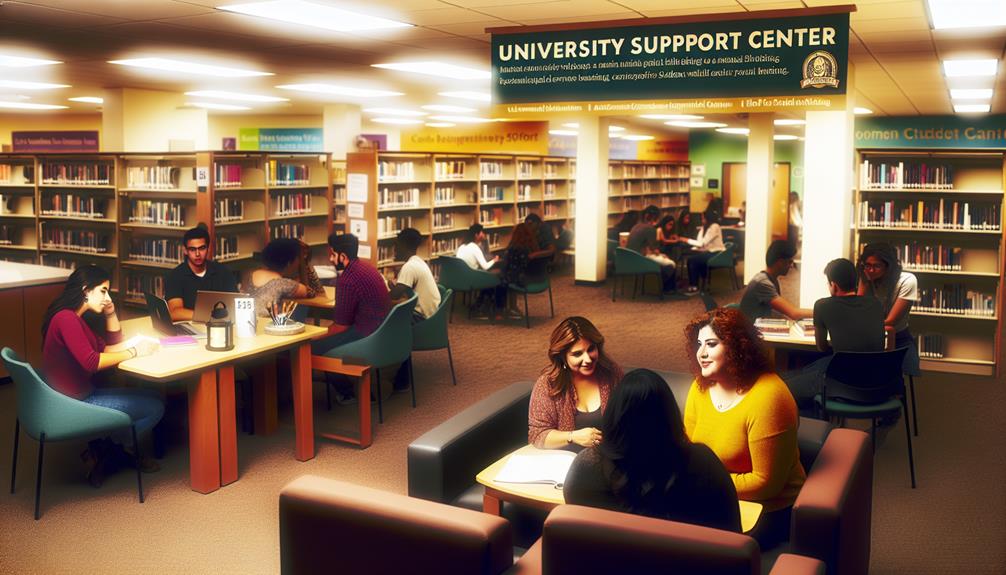Choosing the right university in the USA starts with identifying your passions and career goals. Research various universities and create a shortlist based on their rankings and course offerings. Consider important factors like tuition fees, accommodation, and location. Evaluate financial aid options, as average costs can vary greatly. Don't forget to explore the available support services and networking opportunities. Campus visits can also help you gauge the environment and culture. By taking these steps, you'll be closer to making an informed choice that suits you best. There's much more to uncover to guide you through this essential decision.
Key Takeaways
- Identify your passions and career goals to find a university that aligns with your interests and aspirations.
- Research university rankings and gather information on SEVP-certified institutions to create a shortlist.
- Evaluate course offerings, faculty expertise, and hands-on learning opportunities to ensure they match your academic interests.
- Understand the financial implications, including tuition, living costs, and available financial aid options, to plan effectively.
- Visit campuses, either virtually or in-person, to assess the environment and engage with current students for insights.
Identifying Your Passions
Identifying your passions is essential for your future success, as a genuine interest in your field can boost your commitment during the next few years of study. Start with an honest self-assessment of your interests. Ask yourself what truly excites you and how it aligns with your career goals. A clear affirmative response to whether you can envision a future in your chosen area is a vital first step toward academic and professional success.
Engaging in self-reflection about your passions helps you make logical choices that complement your personal enthusiasm. This process increases the likelihood of academic satisfaction, ensuring that your studies feel fulfilling rather than burdensome. Explore your interests through extracurricular activities or internships; these experiences can provide valuable insights into potential career paths and the relevance of your passions in the job market.
Ultimately, the more you understand what drives you, the better equipped you'll be to select a university that nurtures those passions. Focusing on your interests not only enhances your academic success but also prepares you for an enriching professional journey. So take the time to identify what you love—it's an investment in your future.
Researching University Options
When it comes to researching university options, having a clear strategy can make all the difference in finding the right fit for you. Start by utilizing university rankings like QS, THE, and Shanghai to assess overall quality and subject-specific strengths. Create a shortlist of universities certified by the Student and Exchange Visitor Program to guarantee they're eligible for international students.
Engage with alumni through social media to gain insights into their experiences and the outcomes of their education. Review official university materials and course prospectuses to understand the available programs and how they align with your academic interests.
Consider the financial aspects as well. Verify the estimated tuition costs and living expenses, as average tuition fees for public colleges are around $22,958 and $31,231 for private institutions. Here's a quick overview of some factors you should keep in mind:
| University Name | Tuition Fees | Student Support |
|---|---|---|
| University A | $22,958 | Strong alumni network |
| University B | $31,231 | Excellent student support services |
| University C | $25,000 | Active financial aid packages |
| University D | $30,000 | Engaging international community |
| University E | $20,000 | thorough course prospectuses |
Evaluating Course Offerings

Evaluating course offerings is an essential step in selecting the right university for your academic journey. You'll want to guarantee that the courses align with your interests and career goals, as engaging content can greatly enhance your academic performance and satisfaction. Look for universities that offer flexibility in course selection, allowing you to tailor your curriculum to fit your personal passions.
Pay attention to the prerequisites and specializations available, and don't hesitate to reach out to universities for clarification. Faculty expertise is important; knowledgeable instructors can provide valuable insights and mentorship. For advanced students, explore graduate research opportunities that can enrich your educational experience and tackle major issues in your field.
Additionally, consider the availability of hands-on learning opportunities, such as internships or practical projects. These experiences are essential for gaining real-world experience and applying what you've learned in the classroom. By thoroughly evaluating course offerings and their alignment with your academic and career goals, you can make a more informed decision about the university that will best support your aspirations.
Understanding Financial Implications
Understanding the financial implications of attending university in the USA is essential for making an informed decision. The average tuition fees for public colleges are around $22,958, while private colleges can set you back about $31,231 annually. It's important to differentiate between the sticker price of tuition and the actual cost, which includes housing, transportation, and living expenses. This total financial impact can be substantial.
For foreign bachelor's students, it's critical to note that only about 8% receive full scholarships, so actively seeking various funding sources is key. Explore governmental and private scholarships to help cover your education costs. Additionally, many U.S. colleges and universities offer financial aid packages comprising grants, scholarships, and loans. Understanding these options can help you manage long-term financial commitments.
Early financial planning, including budgeting for tuition and living expenses, can greatly ease the strain of managing finances throughout your college journey. By evaluating your options and planning ahead, you can set yourself up for a successful academic experience without overwhelming financial stress.
Exploring Accommodation Choices

Choosing the right accommodation is a vital part of your university experience in the USA. With various options available, it's important to explore what suits you best. On-campus accommodation is popular for its ability to foster community interaction, providing a supportive environment for new students. These housing arrangements often include shared facilities like kitchens and common areas, making it easier to form friendships and engage socially.
Here are three key factors to ponder when choosing your accommodation:
- Average Rates: On-campus accommodation costs can range from $8,000 to $15,000 per academic year, depending on the university and housing type.
- Themed Housing: Some universities offer themed housing, such as living-learning communities focused on specific academic interests, which enhances both academic and social engagement.
- Early Research: Conducting early research into accommodation options is vital since availability can be competitive. This exploration can greatly alleviate stress during your shift to university life.
Assessing Location Preferences
As you think about your university experience, location plays an essential role in shaping it. Consider the proximity to home; attending a university closer to your family can reduce travel costs and make visits easier, especially if you're an in-state student benefiting from lower tuition rates. You should also evaluate urban, suburban, and rural settings to understand the lifestyle differences. Urban locations often provide more internship and cultural opportunities, while rural areas might offer a tight-knit community feel.
Don't forget to research the climate and weather patterns of potential locations, as these factors can greatly affect your comfort and overall experience. Additionally, the cost of living varies greatly between states and cities; urban areas tend to be pricier, impacting your housing and daily expenses budget.
Networking and Career Opportunities

Networking and career opportunities are essential components of your university experience that can shape your future. Engaging with the right resources can open doors and provide you with the skills you need to succeed. Here are three key ways to enhance your networking and career prospects:
- Utilize Career Services: Many universities offer dedicated career services that facilitate internships, job fairs, and workshops. These resources are invaluable for building connections and gaining insights into your chosen industry.
- Leverage Alumni Networks: Engaging with alumni can greatly enhance your job placement opportunities. Alumni often provide valuable connections and insights that can lead to internships or job offers, as they understand the industry landscape.
- Participate in Internships and Volunteer Experiences: Getting involved in internships and volunteer work not only builds your resume but also cultivates soft skills like communication and critical thinking. Approximately 70% of internships lead to full-time positions, making them a vital part of your career development.
Visiting Campuses Virtually or In-Person
Visiting campuses, whether virtually or in person, plays an essential role in your university selection process. Campus visits help prospective students assess the university's environment, facilities, and overall atmosphere, greatly influencing your decision. Engaging with current students and faculty during these visits gives you valuable insights into the campus culture and support systems, helping you gauge your potential fit within the community.
If traveling isn't an option, virtual tours and interactive online platforms can provide an extensive view of campus amenities and resources. You can still get a feel for the university's vibe. Attending open houses or information sessions during campus visits allows you to ask specific questions about academic programs, extracurricular activities, and financial aid opportunities.
Experiencing the campus through both official tours and informal visits can enhance your understanding of student life and community engagement opportunities available. Whether you're exploring the library, dining halls, or student organizations, immersing yourself in the campus environment is crucial. Remember, this is where you might spend the next few years of your life, so take the time to explore every aspect!
Analyzing University Support Services

Exploring campus facilities and culture is just one part of your decision-making process; understanding the support services offered by a university is equally important. University support services can greatly influence your academic success and overall experience. Here are three important services to take into account:
- Academic Advising: This service helps you navigate course selection and degree requirements, contributing to higher graduation rates. Having access to knowledgeable advisors can make a huge difference in your academic journey.
- Mental Health Services: Many universities provide counseling and support groups to help you manage stress and personal challenges. Prioritizing your mental well-being is essential for both your academic performance and overall happiness.
- Career Services: These offices offer resources like résumé workshops, job fairs, and internship placements, enhancing your employability post-graduation. Connecting with career advisors early can give you a head start in building a successful career.
Additionally, don't overlook financial aid offices, which can help you find scholarships and grants, minimizing financial barriers. If you're an international student, explore international student offices for guidance on cultural integration and academic support tailored to your needs.
Making Your Final Decision
When it comes time to make your final decision about which university to attend, it is essential to weigh all your options carefully. Start by creating a pros and cons list for each shortlisted university, focusing on key factors like academic programs, campus culture, and financial aid offers. This structured decision-making process will help clarify your priorities.
If possible, visit the campuses to experience the environment firsthand. This gives you a feel for whether the atmosphere aligns with your personal preferences and educational goals. Don't forget to review the financial aid packages thoroughly; understanding the difference between grants, scholarships, and loans is vital for evaluating the long-term financial implications of your choices.
Engage with current students and alumni to gain insights about their experiences. Their perspectives can provide valuable context and highlight the effectiveness of the university's support systems. Finally, set a deadline for your final decision—typically around May 1st for fall admissions. This guarantees timely enrollment and helps you avoid missing out on scholarship opportunities. By taking these steps, you'll feel more confident in your final decision.
Frequently Asked Questions
How Do You Know Which University Is Right for You in the Usa?
To know which university's right for you, start by evaluating your interests and passions—this'll guide your choice. Research rankings to find schools excelling in your desired field, and compare tuition costs, keeping financial aid in mind. Think about campus culture and size; smaller colleges might offer personalized support, while larger ones provide diverse resources. Finally, connect with current students or alumni to gain insights into their experiences and the overall environment.
How to Pick the Right University for You?
To pick the right university for you, start by evaluating what you value most. Think about your academic interests, career goals, and social preferences. Research the university's reputation and campus culture, and consider whether you prefer a large institution or a smaller college. Don't forget to look at financial factors, including tuition and available scholarships. Finally, visit campuses to get a feel for the environment and see if it aligns with your aspirations.
Which Type of University Is Best in Usa?
Choosing the best type of university in the USA depends on your needs. If you're looking for affordability, public universities offer lower tuition rates. For a prestigious reputation and more scholarship opportunities, consider private universities. If research is your focus, research universities provide extensive resources. Community colleges are great for starting your education at a lower cost before transferring. Ultimately, think about your goals, learning style, and financial situation to make the best choice.
How Do I Choose a School in Usa?
To choose a school in the USA, start by making a shortlist based on what matters to you, like location and programs. Check rankings and verify schools are certified for international students. Look into tuition costs and financial aid options to gauge affordability. Connect with current students online to hear their experiences, and visit campuses when possible. Engaging directly helps you feel the environment and find the right fit for your education.
